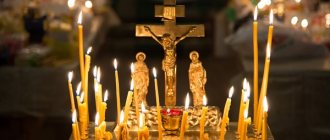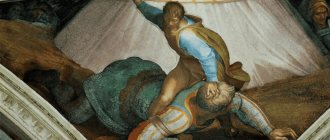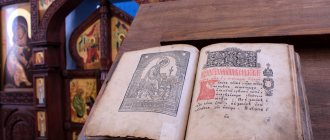In the Hebrew Torah, Latin and Slavic Bibles, the authorship of Psalm 101 is not indicated. There are several options - some researchers believe that it was written by King David, others attribute this chapter of the Psalter to the prophet Nehemiah or Daniel. They are of the opinion that the psalm was written during the Babylonian captivity, since it talks about the destruction of Jerusalem and the empty Tabernacle (a sacred place for Jews and Christians).
About the author About the book
Text of prayer Psalm 101
In Church Slavonic
The prayer of a beggar when he is despondent, and before the Lord he pours out his prayer
1 Lord, hear my prayer and my call to come to you.
2 Do not take your face away from me: on the day when I mourn, turn your ear to me: on the day when I cry to you, hear me quickly.
3 My days are gone as smoke, and my dry bones as withered.
4 I was stung like grass, and my heart was not troubled, because I forgot to bring my bread.
5 Hearing the voice of my sigh, my bones pressed against my flesh.
6 Like a desert owl, like night lying on the water.
7 Bde and bych, like a special bird in this place.
8 Reproach me all day long and praise me with me.
9 Zane's ashes are like bread with poisons, and my drink dissolves in tears.
10 From the presence of your wrath and your wrath: you bring me down, as if you had exalted me.
11 My days are like a shadow gone away, and I am like withered hay.
12 But You, O Lord, remain forever, and Your memory endures for generations and generations.
13 You have risen to the house of Zion when the time to cover it, when the time comes.
14 How your rabbi was pleased with his stone, and its dust harms him.
15 And the nations will fear the name of the Lord and all the king of the land of your glory.
16 For the Lord will build Zion and appear in His glory.
17 Reward the humble for their prayer and do not neglect their prayer.
18 It will be written for a generation, and the people who live in the building will praise the Lord.
19 Like a prince from the high places of his saints, the Lord from heaven to earth to see him,
20 Hear the groaning of the bound; let the sons of the slain
21 proclaim the name of the Lord in Zion and his praise in Jerusalem.
22 They always gathered together as a people and as a king, the porcupine of the work of the Lord.
23 I will answer him in the way of his strength: to make my days disappear.
24 You will not raise me to the forefront of my days: to the generation of your years.
25 In the beginning, O Lord, you founded the earth, and the works of your hands are the heavens.
26 They will perish, but you will remain: and everything will disappear as if I were clothed with a garment.
27 But you are the same, and your years will not fail you.
28 The sons of your servant will inherit, and their descendants will be corrected forever.
In Russian
The prayer of a beggar when he becomes despondent and pours out his prayer before the Lord.
1 Lord, hear my prayer and let my cry reach You.
2 Do not take your face away from me, on the day when I am in pain, turn your ear to me, on the day when I cry to you, listen to me quickly.
3 For my days are gone like smoke, and my bones are withered like brushwood.
4 I was cut down like grass, and my heart was dried up, so that I forgot to eat my bread.
5 Hearing the voice of my groan, my bones pressed against my flesh.
6 I became like a pelican in the desert, I became like an owl in ruins.
7 I did not sleep and became like a bird sitting alone on the roof.
8 All day long my enemies insulted me, and those who boasted about me swore by me.
9 For I have eaten ashes like bread, and melted my drink with tears
10 Because of your anger and your wrath, because you exalted me, you brought me down.
11 My days are crooked like a shadow, and like grass I am withered.
12 But You, Lord, remain forever, and Your memory will endure for generations and generations.
13 Thou who art risen, have mercy on Zion, for the hour has come to have mercy on her, for the hour has come
14 For your servants loved her stones and had compassion on her dust.
15 And the nations will fear the name of the Lord and all the kings of the earth for your glory,
16 For the Lord will build Zion and appear in His glory.
17 He looked upon the prayer of the humble and did not despise their prayer.
18 They are writing this for another generation, and the people who are built will praise the Lord,
19 When he bowed down from his holy heights, the Lord looked down from heaven to earth,
20 to hear the groans of prisoners in order to save the children of the murdered,
21 proclaim the name of the Lord in Zion and his praise in Jerusalem,
22 When nations are gathered and kings serve the Lord.
23 He spoke to him on the way, in the days of his strength: “I will tell myself about my few days;
24 Do not take me away in the midst of my days: your years pass from generation to generation.”
25 In the beginning, O Lord, you founded the earth, and the heavens are the work of your hands;
26 They will perish, but you will remain, and everything will be spoiled like a garment, and like a garment you roll it up and change it.
27 But you are the same, and your years will not end.
28 The sons of your servants will find refuge, and their descendants will be firmly established forever.
Interpretation
A voluminous prayer requires explanation, so the interpretation of the verses of Psalm 104 allows us to understand all the greatness of the Lord.
Verses 1-5: In them the singer calls on the people of God to tell the whole world about the great things of the Lord. Glorify him and tell the people about him, about the creation of the earth and the role of the Almighty in relation to all humanity. People should praise God as a sign of gratitude and appreciation. The task of people is the search for God and faith. Only they will help you feel the joy of life, alleviate suffering and instill hope for a better life.
Verse 6: The descendants of Abraham were commissioned to bring the good news to the people. This meant not the actual descendants of his family, but representatives of all nations who accepted Christianity, regardless of age and gender. The Lord's servants must carry the word of God to other people, explaining the truth about it.
Verses 7-11: The promises of the Lord are holy, and this is the promise made to Abraham. He and his descendants must receive the land of Canaan for eternal use, but this will happen in due time, but this will happen when the world order of God is established under the rule of Jerusalem.
Verses 12-15: God sacredly protected the descendants of Abraham from the moment when the number of the family was still small. Abraham's children felt like strangers among those around them. The Lord forbade them to be harmed.
Verses 16-19: we are talking about the exaltation of Joseph in Egypt, for whom the Lord prepared serious trials, including prison.
- Verses 20-21: In order to appear before the eyes of the Egyptian Pharaoh, Joseph passed the tests appointed by the Lord. In this way, God was able to verify Joseph's faithfulness to the works of God.
- Verse 22: In Egypt, Joseph was entrusted with teaching the nobles, which is not surprising, since Joseph was a conductor of the wisdom of the Lord.
- Verses 23-24: It tells of God's decision to preserve the purity of the blood of the people of Israel, even though their representatives lived in a foreign land. Mixing his blood with foreigners was considered unacceptable, which significantly strengthened the Israeli family.
- Verses 25-27: At the appointed time, the Lord decided that the Israelites should leave Egypt. Moses became his guide, and Aaron was assigned to help him. God sent them his signs, which were supposed to indicate the time of his arrival in Israel.
- Verses 28-36: The Lord brought down His punishment on Egypt, where they doubted the truth of His Word: He sent darkness, turned the water into blood and killed the fish, depriving the apostates of food. Instead of rain, hail was sent, causing the death of vineyards and fruit trees, and also sent other punishments that impressed the people of Israel and instilled faith in the power of God.
- Verses 37-38: It says that after ten plagues were committed on the Egyptians, the Israelites were taken out of Egypt. They were very happy about this, because they were tired of the spectacle of executions and were afraid of the power of God.
- Verses 39-44: The Lord protected the Israelites who went to the promised land, sending them food and drink on the way to Canaan, thereby fulfilling the promise given to Abraham. And he gave as an inheritance land where there was no need to work - it was already ready for life on it.
- Verse 45: Everything that happened to the people of Israel was provided for by the promise to Abraham that people would live according to God's rules, keep them, and receive the blessing of the Lord.
We advise you to study Prayers for a child to sleep peacefully at night
History of writing
There is no exact information about the authorship of Psalm 101; expert opinions are divided into two areas. Analysis of other scriptures and songs from the Psalter has shown mixed results. Some are inclined to believe that the song was written by King David during the rebellion of his son Absalom, who not only attracted many of his courtiers to his side, but also persecuted his father. The betrayal of his son was a terrible blow for David, many nobles turned away from him, even the army submitted to Absalom, who wanted to overthrow his father. Lonely, betrayed, forced to hide, David was defeated and broken, he prayed to the Lord for help and protection, finding salvation in nothing else.
Another part of theologians believes that the text of Psalm 101 refers to the events of the Babylonian captivity of the Jews. They attribute the singing to the prophets Daniel or Nehemiah, but even here there is no accuracy.
Interpretation
The psalmist offers blessings to God on behalf of the community of faithful people gathered for the sacrifice. In the lyrics of the song, the Lord is extolled as the Savior.
Psalm 106 can be divided into four episodes or parts (verses 4-9, 10-16, 17-22, 23-32). They are arranged in a single composition according to the model: punishment for sins in the form of suffering, prayers for salvation, salvation itself. The author who created this psalm sought to convey to his compatriots the idea of \u200b\u200bthe need to praise the Lord and humbly obey Him.
For a more detailed interpretation of Psalm 106, one should consider its verses individually:
- Verses 1-2 - the author turns to God and praises him.
- Verse 3 - the psalmist talks about the Red Sea, through which the Jewish people had to pass when leaving Egypt, and about the four cardinal directions, from where the Lord again gathered the Jews to Blessed Palestine.
- Verses 4-7 - describe the picture of the moral oppressed state of the Jews, their desire for their native Palestine.
- Verses 7-8 - the author says that the Lord showed the Jewish people a straight path to return to their homeland.
- Verse 9-19 - these verses describe the feeling of joy of people upon returning to their homeland, it says that the prayers of the suffering were heard.
- Verses 19-22 – The psalmist draws a comparison between being in captivity and being in a dark prison cell, in which the “prisoner” would certainly perish if not for “the word of the Lord.”
- Verses 23-32 - these verses describe the insecure and powerless life of the Jews in captivity, their salvation by the Lord.
- Verses 33-34 paint a picture of Palestine devastated by wars.
- Verses 35-38 - the psalmist joyfully says that the hard work of the Jewish people transformed Palestine, and God rewarded the people by sending a bountiful harvest;
- Verses 39-43 - the author says that the former enslavers perish, and the Jewish people are restored.
We advise you to study Is it true that we worry about our sins?
The text of Psalm 106, which tells the story of the captivity and exodus of the Jewish people, clearly shows the hand of the Lord protecting and helping pious people.
When to read Psalm 101?
For a better understanding of the house, you are allowed to read Psalm 101 in Russian; During services, songs are performed in the Old Church Slavonic version. The text should be recalled in the following situations:
- in case of problems and difficulties, when it seems that there is no solution to the problem.
- when there is no confidence in the future and hope for the best;
- with loss of desire to live, disappointment in life;
- in difficult times, when despair and desperation overwhelm;
It is recommended to read Psalm 101 before the icons; you can light a candle or lamp. It is important to understand that this prayer is not self-pity and consolation, but a prayer for help and repentance.
Interpretation of Psalm 101
To analyze the song, interpret Psalm 101, you must look at each verse individually.
The first verses describe the unfortunate situation of the author, while we must not forget the caption under the text of Psalm 101, which shows that everyone, both the king and the shepherd, has difficulties in life. The calamities and misfortunes described in these lines show the desperate situation of the psalmist, his despondency and his powerlessness in the face of the enemy. The author speaks of itself as something dry and burnt, which can turn into dust from an accidental touch or a gust of wind. There is also a comparison with the pelican, a deep-dweller found in the desert. These lines correspond both to the history of the Jewish people, cut off from their home and deprived of a future, and to the life of King David, abandoned by everyone and persecuted by his son.
True repentance can be seen in the verses; the author admits his guilt before the Lord and his omnipotence. But the prayer for forgiveness, for the mercy of God, which is the only salvation for both man and the entire people, does not subside.
In verses 17-24 of Psalm 101, the author finds hope and confidence in the future. It says that the Lord will hear prayers, deliver believers from troubles and curses, and punish sinners for their crimes. The last verses glorify the Lord as Creator and Protector. God is eternal, therefore only in Him will the righteous find salvation and consolation.
History of Psalm 100 and its interpretation
Authorship is attributed to the king and prophet David. The text of Psalm 100 was written not only as a consequence of the sudden death of King David's servant. This song also has its own deep meaning, which is easier to understand by analyzing the interpretation of Psalm 100 verse by verse:
- The first line of the psalm is prophetic. David says that God combines mercy and judgment - such seemingly contradictory concepts to the ordinary human eye. On the one hand, the Lord is all-merciful, but on the other, He is the righteous Judge of not only deeds, but also words, and even thoughts.
- Verse 2-3. If the Lord is the Judge, then I “will meditate on the blameless path,” says the prophet, I will seek how to act well before the Lord, I will purify my thoughts and feelings. King David also advises not to allow unclean, selfish thoughts and to act piously. But one should abstain not only from unrighteous actions, thoughts and feelings, but also from people who act deceitfully.
- In verse 4, the author advises not to pay attention to false suggestions, try not to think about them, and not to take such “pretexts” to heart and mind. “I have not known the evil one who turns away from Me (that is, from the Lord),” that is, on his way the prophet did not recognize and accept the false, evil intentions of people who depart from God. The psalm also advises young and old “those in power” to listen to good advice and beware of criminal people in order to keep lies away from themselves.
- Verse 5 is a prophetic testament to move away from people who spread false accusations and gossip, since such a person can tell lies both about the king himself and about his neighbor.
- In verses 6-7, David confirms that “planting,” that is, doing good, creative deeds, must be done with those who are faithful to God, worthy people with pure thoughts. And proud and deceitful people can harm God's work.
- The words “In the morning I beat all the sinners of the earth” should not be taken literally. “Earth” here is the heart, and “wicked”, which must be “killed” in the morning, are evil thoughts that we do not want to have, but they themselves appear in the heart, like weeds from the ground. They must be killed without pity, and from an early age, so that they do not take root and conquer “in the city of the Lord,” that is, in the holy soul.








